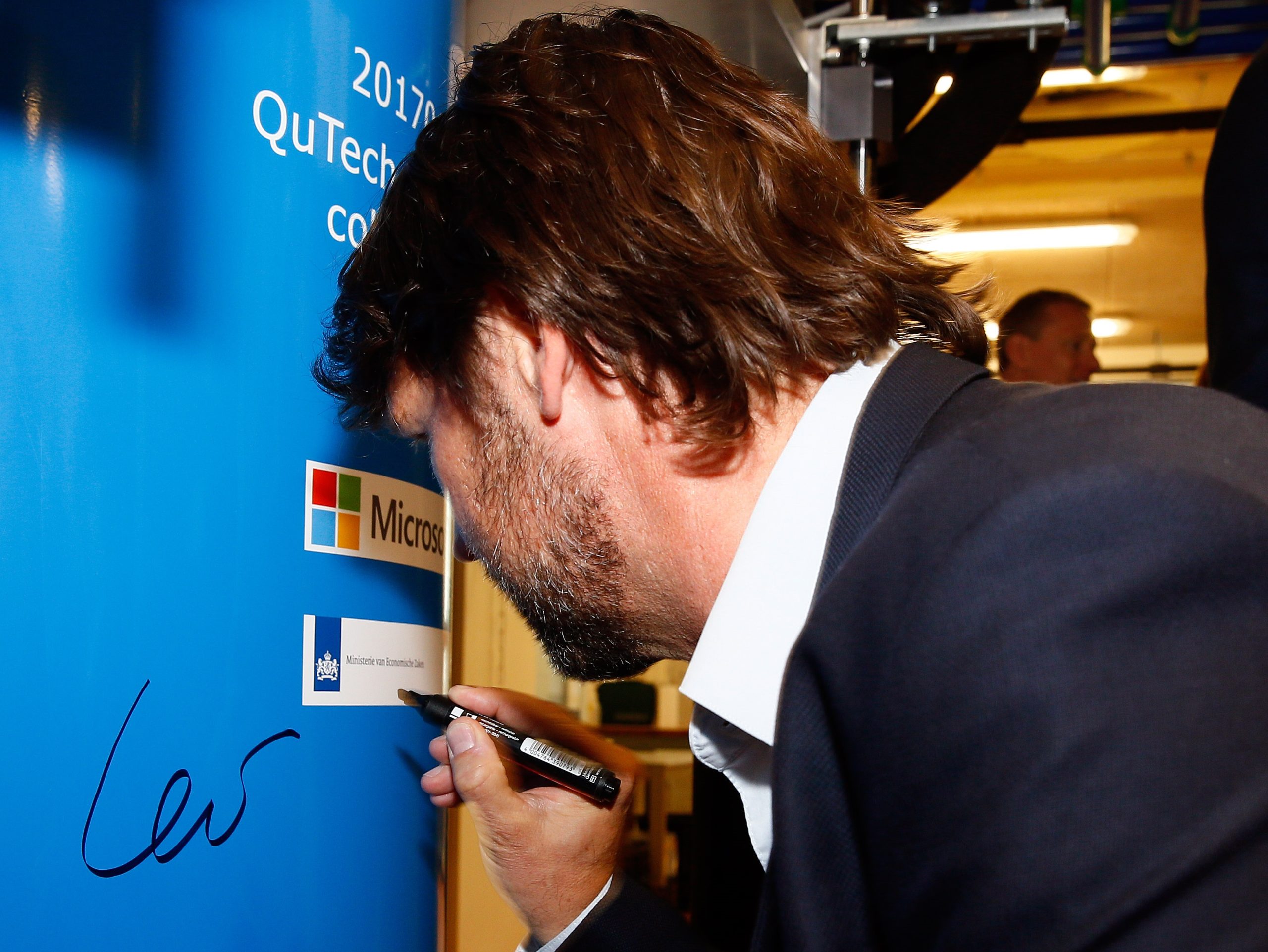A revealing report asserts that Professor Kouwenhoven of Quantum Transport and postdoc Zhang (partially culpable) were negligent in their Majorana study.
The LOWI holds Kouwenhoven responsible, but does not believe he breached scientific integrity. (Photo: Roy Borghouts)
The report by the LOWI (National Scientific Integrity Body) was made public on Wednesday 8 June and was followed by a press release issued by TU Delft. In the press release, the Executive Board reiterated LOWI’s conclusion that Leo Kouwenhoven and Hao Zhang were ‘partly negligent and partly culpably negligent’, but that there was no violation of scientific integrity.
The LOWI report (in Dutch) says that the Executive Board had previously deemed the researchers’ actions as ‘lightly violating’ scientific integrity. But, according to LOWI, this qualification does not even exist. Furthermore, LOWI does not believe that a violation of scientific integrity occurred, as there was no explicit intention when Kouwenhoven and his doctoral candidate Zhang zoomed in on research data that confirmed their end goal and in so doing, left other – less opportune – data aside. This is also known as confirmation bias.
The case revolves around the Nature article entitled Quantized Majorana conductance published in 2018. In the article, the researchers, led by Kouwenhoven, wrote that they had detected majorana particles. This hit the headlines as the results seemed too good to be true. And they were. At the time, Kouwenhoven did not take note of it, he told Atlas (a radio programme) in May after two years of silence. “Had I thought about it, I could have avoided all this.” In a reconstruction in the Vrij Nederland magazine, he is quoted as saying ‘We conducted research into positive outliers and zoomed in on them. We should have been more critical in doing so. This is then a case of culpable confirmation bias.’
Data selection
The Research Integrity Committee (CWI) at TU Delft started examining the case in March 2020. It had an experts report issued after which it drew up and examined a complaint under an ex officio investigation. On 26 March 2021, an – as yet unpublished – recommendation to the Executive Board followed. The CWI’s conclusion, in contrast to the LOWI, was that a violation of integrity did in fact occur. This is now covered in the LOWI report. The CWI then made unspecified recommendations for ‘recovery measures’ to the Executive Board, which only adopted some of them.
What the Executive Board did not do, states the report, was have an investigation done into the culture at QuTech where the Majorana research took place. The Executive Board initially did not want to conduct further investigations into publications by Kouwenhoven’s group, which the CWI had advised it to do. Eventually, other publications were investigated in the wake of new reports.
‘Complaints procedures are increasingly resembling ordinary legal procedures’
Back to the LOWI. It talks about negligent and culpably negligent actions by Kouwenhoven and Zhang. The former refers to the way in which they selected their data, and the latter refers to the ignoring of certain data. According to the LOWI, both researchers acted in breach of three basic principles in the Netherlands Code of Conduct for Research Integrity: ‘honesty and scrupulousness’, ‘transparency’, and ‘responsibility’.
The LOWI places the responsibility on the first author Zhang, but ‘corresponding author’ and supervisor Kouwenhoven bears ‘full responsibility’ according to the LOWI. According to this agency, TU Delft should state clear rules and record agreements so that research supervisors such as Kouwenhoven ‘can carry out their responsibility adequately and if necessary can be addressed on it’.
Lawyers
In connection with this case, the LOWI raises another issue, namely that complaints procedures are increasingly resembling ‘ordinary legal procedures in which lawyers or other legal advisors’ engage in discussion and ‘positions are substantiated and defended in detailed legal argumentation’. To the LOWI, this is ‘not a desirable development’.
The LOWI report paints a picture of opposing parties: Kouwenhoven and Zhang on one side, and the Executive Board and the CWI on the other. The LOWI describes Kouwenhoven’s objections to the complaints procedure. In that description terms can be read such as ‘unclear and dishonest’, ‘not transparent’, ‘too late’, ‘insufficient hearing both sides of story’, ‘one sided, speculative and containing incorrect assumptions’. Kouwenhoven also accuses the Executive Board of violating its duty of confidentiality, the CWI of being biased and not objective, and that the procedure took too long.
The LOWI refutes Kouwenhoven’s arguments in his defence except for one point: the procedure was ‘not negligent’, but the CWI should have given Kouwenhoven both the experts’ opinion as well as its ‘substantive correspondence’ with these experts.
In the TU Delft press release, Rector Magnificus Tim van der Hagen stated that the case will also be used to tighten the integrity programme at QuTech and TU Delft. He also plans to continue the dialogue between ‘the Executive Board, QuTech’s Management and senior researchers’ about scientific integrity.
Do you have a question or comment about this article?
s.m.bonger@tudelft.nl


Comments are closed.